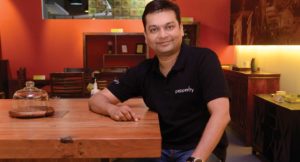Porter, which was recently funded by Sequoia Capital, uses technology to improve the efficiency of the LCVs, plans to expand to other tier I and II cities in the next two to three years, grow its revenues at 25 per cent to 30 per cent, and offer a fleet of 15,000 trucks on its platform.

Industry estimates indicate that the Indian logistics market is pegged at US $150 billion, and last mile connectivity constitutes 25 per cent of that. Thirteen per cent of the GDP is spent on logistics – which is higher than in developed countries, where it is eight to nine per cent. The industry itself has not changed in the last 100 years, and is very inefficient – cost and time wise.
Pranav Goel and Uttam Digga from IIT Kharagpur, with experience in analytics, and Vikas Choudhary from IIT Kanpur, who has technology experience, founded Porter in August 2014to improve logistics efficiencies using technology. “We interviewed 5000 LCV owner-drivers to understand their utilisation, and discovered that in a day, they effectively used only three hours, made just 1.2 trips on an average and earned about Rs 1000. They had no profit to speak of,” points out Goel. Improving the trip rate and enabling the LCV drivers to make more trips would improve their earning capacity.
Porter’s platform enables customers to preplan their logistics needs and call the driver on time
Aggregator Platform
Porter developed an aggregator platform and initially partnered with two people to demonstrate its effectiveness. The trip increased to 2.5 in a day, fetching them Rs 15,000. Even after paying 20 per cent to Porter as commission, the drivers’ take home improved to Rs 200 a day.
In the initial days, to increase the number of operators on its platform, Porter assured them a minimum take away every day. Today, it has 3000 plus operators and 10,000 transactions a day. This Bangalore-based venture has expanded its operations to four more cities – Delhi, Chennai, Hyderabad and Mumbai.
Porter received seed fund from Kae Capital in 2015, and Rs 35 crore in Series A from Sequoia that enabled it to expand its operations.
Three-Pronged Approach
Typically, logistics includes four elements – loading, unloading, the trip and the waiting time. Since drivers would rarely arrive on time, the customers would ask them to come in advance to the loading site. At the loading site, since the customers did not have to pay for the time taken, the loading would take its own time. Then the trip time would depend on traffic. At the unloading site too, there was no pressure to complete it on time. For intra-city trips, the vehicle would return empty.
Porter’s platform enables customers to plan their logistics needs in advance and call the driver on time. The driver too is equipped with a mobile app that records right from when he arrived at the customer site to the time he reaches the unloading site. This has improved the efficiency of the entire process.
The driver also gets information of any other loading needs near the unloading site so that he does not return empty and can increase the number of trips, thus earning higher. Any detours, stalling and delays are also tracked, thus improving transparency and accountability.
Similarly, it alerts them to areas where there is greater demand for trucks so that they can move to that area and improve their chances of getting deployed.
On the customer side, the platform caters to two kinds – the large institutions such as Flipkart, ITC, etc, and small and medium enterprises. Typically, the larger organisations would have a middleman managing their logistics need, and associated cutbacks that would cause leakages. Also, they would get a fleet of 100 but use only 60 fully, the remaining 40 would be underutilised.
Porter offers the organisations a better planning mechanism to understand their utilisation patterns and the remaining can be connected to the Porter platform for better utilisation. This has also resulted in 33 per cent savings for customers, who constitute 30 per cent of Porter’s business. They get a dashboard to manage their fleet operations on the Porter platform.
The remaining 70 per cent business comes from small and medium businesses. Theirs is more unplanned, and due to lower volumes, end up paying higher. Every transaction also requires them to negotiate afresh. Porter’s platform makes it convenient and transparent for them to book a mini-truck as and when they need at standardised rates.
The product is being improved constantly and the next feature Porter intends to add is business intelligence and analytics to capture usage patterns and improve efficiencies further.
Drivers are provided training when onboarding to be able to adapt to the demands of the new way of operating and benefit from the technology while also delivering customer delight.
Automated payouts, road tax and toll are made easy to use for customers and drivers alike.
FOS Solution
For its feet-on-street salespeople, Porter has an app that highlights likely customers that they can approach. They get reminders and after conversion, they alert the sales people to handhold customers whenever they use the service for better user experience and overcome teething problems.
The tool also has workarounds in case of any difficulties with access to Internet, wrong distance calculations due to noise in GPS and so on.
Moving Forward
The company is 200-members strong, with 30 constituting the core team, which is drawn from premiere institutions such as the IIT. In the next two to three years, the company plans to expand to other tier I and II cities such as Pune, Ahmedabad, Kolkatta and Indore among others.
The company is expected to grow its revenues at 25 per cent to 30 per cent, and offer a fleet of 15,000 trucks on its platform. The customer base is also expected to expand correspondingly from 20 institutions and 35,000 SMEs.
Porter believes that this will change the face of the logistics industry, especially the last mile, making it more professional while effecting cost and time savings.
CONCEPT IN BRIEF
The LCVs – light commercial vehicles – are typically driven by owner/drivers who effectively utilise only 3 hours every day, making an average of 1.2 trips and earning Rs 1000 a day. Porter, started by three IIT alumnus Pranav Goel and Uttam Digga, and Vikas Choudhary, with their own capital and then seed fund from Kae Capital, is an aggregator platform that has improved the driver efficiency by linking demand and supply for these vehicles. Now, drivers easily make 2.5 trips a day and earn Rs 1500 a day. The solution also helps large institutions manage their fleet requirements, improve planning and scheduling, reduce cost and time wastages and effect savings. It also helps small businesses book vehicles without the hassle of negotiating the rates every time. Porter also received Rs 35 crore funding from Sequoia Capital in Series A, which has enabled it expand to five cities. In another three years, it expects to grow by 25-30 per cent, and expand its fleet from 3000 to 15000 trucks.
SNAPSHOT
Porter
Founded by: Pranav Goel and Uttam Digga, and Vikas Choudhary
Funded by: Sequoia, Kae
Focus: Technology platform for LCVs




